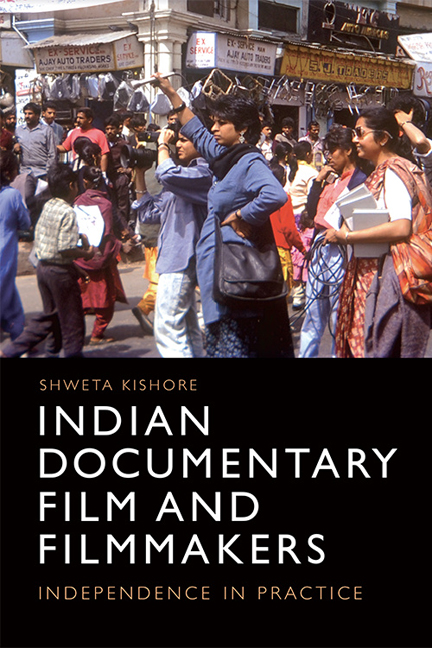Afterword
Published online by Cambridge University Press: 24 April 2021
Summary
Unlike a closed field of competition that obeys its own logic, Indian independent documentary, as I have shown, is marked by cultural and formal heterogeneity that undoes forms of categorisation associated with art and activism, critical and popular spectatorship, authorship and collaboration, expression and institution. Inside and yet struggling to maintain sovereignty from social authority systems, the complexity of the practice is an expression of artistic consciousness that reflects the reflexive social and artistic histories of the form. Independence notably articulates the multitude of documentary practices that patently examine heteronomous authority systems of art, culture, social and political institutions and reflexively, the histories, canons and traditions of the documentary form. It is through multiple levels and scales of intervention, social and textual, that independent documentary attempts to produce alternative sets of meanings that represent a challenge to the systems that govern subject positions, experiences, possibilities and desires. Heterogeneity, difference or particularity of functions, values and imaginaries is central to this conceptualisation of independence and its diverse meanings.
Admittedly, my focus on the practice and films of selected filmmakers does not claim to be representative of the plurality of the practice. However, it focuses upon a sustained and substantive trajectory of filmmaking by practitioners who have continued to make films in the independent mode over three decades, with nearly seventy-five films between them. Whilst making a significant contribution to public visual culture and narrative formation, documentary filmmakers, I have argued, hold the key to our understanding of independence, occupying the position of agent and subject, whose position can be understood primarily by examining responses to narrow definitions of ‘function’ that have plagued documentary film and filmmakers historically and in contemporary times. Where ‘functions’ carries meanings that harness images and image-makers to measurable phenomena of profit-making, institutional communication, consumption or mass persuasion, independent documentary works to challenge the teleological meaning of ‘function’ and its use as a yardstick to evaluate the value and legitimacy of cultural production and cultural producers. Examined from the point of view of artistic practice, a mobile and dynamic bricolage of non-standard, asystematic and reflexive practices emphasises a reconceptualisation of the function of culture.
- Type
- Chapter
- Information
- Indian Documentary Film and FilmmakersIndependence in Practice, pp. 162 - 168Publisher: Edinburgh University PressPrint publication year: 2018



